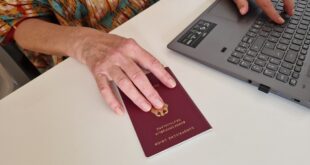Germany granted residence permit to some 35,000 Eritrean refugees last year. This entitles them to bring their families over. But not all are successful. Daniel Pelz of Deutsche Welle (DW) reports on the reasons for this.
With its population of around five million, Eritrea is one of the main countries of origin of African refugees. Young people especially are among those fleeing the brutal Horn of Africa dictatorship to escape indefinite conscription, poverty and a lack of prospects.
Since the German embassy in Eritrea has no visa section, citizens seeking to join relatives already granted permanent residence in Germany have to travel to neighbouring countries to seek visas that will reunite them.
Last year, German embassies in Ethiopia, Kenya and Sudan processed 808 such family reunification applications; 394 applications, or 48.8 percent, were approved.
‘High bureaucratic hurdles’
These figures were calculated with the help of an as yet unpublished response to a question posed by the Left party faction in the German federal parliament, which DW has obtained.
“High bureaucratic hurdles” are to blame for the problems with family reunification, in the view of Left party lawmaker Ulla Jelpke.
“I’m shocked that family reunification is apparently being made so difficult for these people. It leads to human tragedy,” the domestic affairs spokeswoman told DW.
As a rule, applicants have to be in possession of a passport. Spouses also need to be able to prove that their marriage has been officially registered in Eritrea.
The Left party finds these requirements unreasonable. “That the federal government expects people to obtain these documents from a military dictatorship, or officials of this dictatorship, is impossible. Naturally, people are extremely frightened to go there or send relatives there,” said Jelpke.
She referred to media reports of the backlash that relatives of refugees must fear from authorities. Eritreans abroad are also obliged to pay penalties to the state.
The German federal government, however, considers its visa application requirements to be acceptable. In response to the query from the Left party, the foreign ministry wrote “there is no systematic correlation between deserting or withdrawing from military service and the refusal by an Eritrean embassy to issue a passport”.
Long visa processing times
In addition, the foreign ministry said there were cases at the embassy in Addis Ababa when the requirement to show a passport was waived. Documents confirming marital status were also easy to obtain, it claimed.
The federal government declined to say how long it takes to issue a visa. “An average processing time could not be determined,” the ministry statement said, pointing out that appointments for first visits are deleted after six months.
During a visit to Jordan by German Foreign Minister Heiko Maas last month, relatives of Syrian refugees complained about the long processing times. Jelpke believes that the relatives of Eritrean refugees are experiencing the same thing. “My practical experience is that people wait months – if not years – before anything happens,” she said.
In its answer to the Left party’s query, the federal government also mentioned a shortage of available appointments at the embassy in Addis Ababa, where most applications for family reunifications were made in the past year.
Instead of being able to book an appointment online, applicants have to add their names to an appointments list. The embassy then works through this list in the order of entries, the federal government said.
According to the government’s response to the Left party query, in total just over 20 people deal with processing visas, not only for the relatives of Eritrean refugees, but for all applicants — a situation that needs to be rectified by increasing staff levels, Jelpke told DW.
© DW
 THE AFRICAN COURIER. Reporting Africa and its Diaspora! The African Courier is an international magazine published in Germany to report on Africa and the Diaspora African experience. The first issue of the bimonthly magazine appeared on the newsstands on 15 February 1998. The African Courier is a communication forum for European-African political, economic and cultural exchanges, and a voice for Africa in Europe.
THE AFRICAN COURIER. Reporting Africa and its Diaspora! The African Courier is an international magazine published in Germany to report on Africa and the Diaspora African experience. The first issue of the bimonthly magazine appeared on the newsstands on 15 February 1998. The African Courier is a communication forum for European-African political, economic and cultural exchanges, and a voice for Africa in Europe.


































